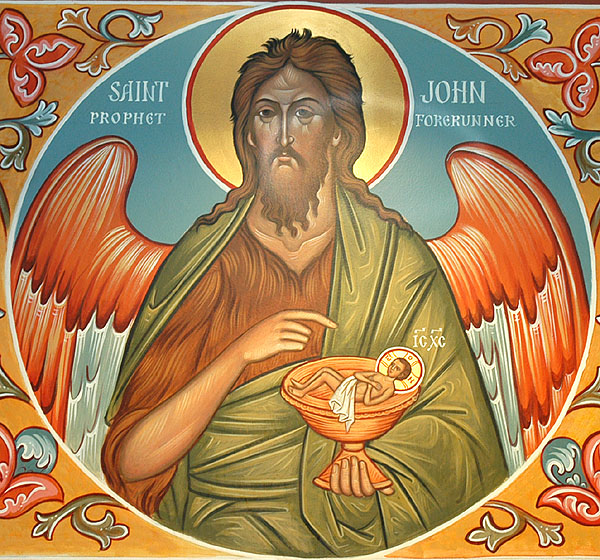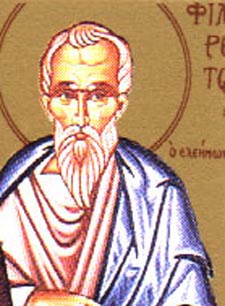The Lenten Prayer of St. Ephraim
+ O Lord and Master of my Life, take away from me the will to be lazy and to be sad, the desire to get ahead of other people, and to boast and brag.
+ Give me instead a pure and humble spirit, the will to be patient with others and to love them.
+ Grant O Lord, that I may see my own mistakes, and keep me from judging
the things other people do. For you are blessed, now and forever, and to ages of ages. Amen.
+++
Liturgy of the Presanctified Gifts
As we already have seen, the eucharistic Divine Liturgy is not celebrated in the Orthodox Church on lenten weekdays. In order for the faithful to sustain their lenten effort by participation in Holy Communion, the Liturgy of the Presanctified Gifts is served. The service is an ancient one in the Orthodox Church. We officially hear about it in the canons of the seventh century, which obviously indicates its development at a much earlier date.
Synaxis of the Holy Glorious Prophet, Forerunner and Baptist John
 In the Orthodox Church it is customary, on the day following the Great Feasts of the Lord and the Mother of God, to remember those saints who participated directly in the sacred event. So, on the day following the Theophany of the Lord, the Church honors the one who participated directly in the Baptism of Christ, placing his own hand upon the head of the Savior.
In the Orthodox Church it is customary, on the day following the Great Feasts of the Lord and the Mother of God, to remember those saints who participated directly in the sacred event. So, on the day following the Theophany of the Lord, the Church honors the one who participated directly in the Baptism of Christ, placing his own hand upon the head of the Savior.
Saint John, the holy Forerunner and Baptist of the Lord, whom the Lord called the greatest of the prophets, concludes the history of the Old Testament and opens the era of the New Testament. The holy Prophet John bore witness to the Only-Begotten Son of God, incarnate in the flesh. Saint John was accounted worthy to baptize Him in the waters of the Jordan, and he was a witness of the Theophany of the Most Holy Trinity on the day of the Savior’s Baptism.
St. Nicholas, Bishop of Myra + December 6
The truth of things revealed thee to thy flock as a rule of faith, a model of meekness, and a teacher of temperance. Therefore thou hast won the heights by humility, riches by poverty. Holy Father Nicholas, intercede with Christ our God that our souls may be saved.
Saint Philaret the Merciful
 Saint Philaret was born in the beginning of the 8th century in the Paphlagonian region of Asia Minor (now territory of Turkey). He was a rich nobleman, whose righteous parents brought him up in the spirit of love for God and compassion for people. He retained those merits for all of his life. He lived happily with his wife and 3 children (a son and two daughters). Being rich did not harden his heart like it happened to many other people in similar circumstances. On the contrary, he felt compassion towards the poor and cared for them always bearing in mind that faith alone without good deeds is barren. Many paupers, widows and orphans knew him as kind person and generous benefactor.
Saint Philaret was born in the beginning of the 8th century in the Paphlagonian region of Asia Minor (now territory of Turkey). He was a rich nobleman, whose righteous parents brought him up in the spirit of love for God and compassion for people. He retained those merits for all of his life. He lived happily with his wife and 3 children (a son and two daughters). Being rich did not harden his heart like it happened to many other people in similar circumstances. On the contrary, he felt compassion towards the poor and cared for them always bearing in mind that faith alone without good deeds is barren. Many paupers, widows and orphans knew him as kind person and generous benefactor.
Many years passed by, and then through God’s will, St. Philaret was tried by affliction, like in the old days when Righteous Job, the-Much-Suffering, was tested. Quite unexpectedly, Izmail Arabs attacked the area where St.Philaret lived and devastated the land. They captured his slaves, livestock and fields, leaving him with just a house, a small field and a couple of oxen. Without bemoaning, Philaret accept his misfortunes saying, like Job: "God giveth, God taketh away. Blessed be His name for ages."

